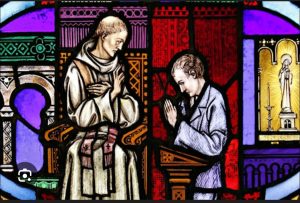
Deaf individuals experience the world differently, not through sound, but through sight, gesture, and sign. This mode of communication does not diminish the spiritual depth of their faith; rather, it offers unique insights into how God’s grace transcends language. In the confessional, Deaf penitents seek the same healing and forgiveness as any other member of the Body of Christ; however, the process must accommodate their unique language and needs.
What does Canon Law say about the Sacrament of Reconciliation?
The Code of Canon Law, under the Obligation and Rights of all Christian Faithful, fully affirms the rights of the Deaf to receive the sacraments. Canon 213 of the Code of Canon Law states: “The Christian faithful have the right to receive assistance from the sacred pastors out of the spiritual goods of the Church, especially the word of God and the sacraments.” This includes providing access to confessions in a form that the penitent can understand and express.
However, in 2004, the Pontifical Council for the Pastoral Care of Migrants and Itinerant People issued guidelines specifically addressing the pastoral care of Deaf people. It encouraged dioceses to train clergy in sign language or to provide qualified interpreters to ensure that Deaf Catholics are not spiritually neglected.
For the Deaf and the sacrament of reconciliation, confessions in sign language may take place in several ways:
- With a priest fluent in sign language: This is ideal, as it allows for a direct and private exchange. This is what we are doing in the Archdiocese of Cincinnati: providing time and space at specific parishes for the Deaf to access confessions in their own language (ASL).
- With a qualified interpreter present: The Code of Canon Law no. 990 and 983, section 2 explains that no one is prohibited from confessing through an interpreter as long as abuses and scandals are avoided, and without prejudice to the prescript of Can. 983, Sec. 2, which permits the presence of an interpreter if needed, with the strict requirement that the interpreter uphold the seal of confession with absolute confidentiality. Although the Canon Law permits this method of going to confession, however, from my wealth of experience in “Deaf Culture”, it is very difficult to see the Deaf go to confession in the presence of a licensed interpreter when the priest does not know sign language.
- In written form: As a last resort, confession may be made in writing, with the paper destroyed after absolution to protect privacy. This kind of method is adopted in places where no priest knows ASL. However, it is recommended that the priest be kind enough to write out the penance of the penitent and hand it over to the Deaf before he or she leaves the confessional.
Whatever the mode may be, the focus remains on the penitent’s contrition and the priest’s absolution, which are two elements that are not dependent on vocal speech but on a sincere heart and pastoral care.
Despite these provisions, we still face many challenges in getting the Deaf to go to confession. Many Deaf Catholics still face barriers to the Sacrament of Reconciliation. There are relatively few priests who know sign language, and access to interpreters can be limited. Furthermore, the personal nature of confession can make the presence of an interpreter uncomfortable for some Deaf individuals, especially if they are part of the same small community.
One good thing is that some dioceses have made remarkable efforts to address these needs by:
- Encouraging seminarians to learn sign language.
- Hosting Deaf-specific retreats with opportunities for confession.
- Collaborating with Deaf ministry offices to train interpreters in the liturgical and theological language necessary for the sacraments.
A Call to Greater Inclusion:
The Deaf community is not peripheral to the Church; it is an integral part of it. Pope Francis repeatedly emphasized the Church’s responsibility to “accompany and include” all the baptized, regardless of ability. Providing accessible reconciliation is not merely an act of accommodation. It is a matter of justice and pastoral love. The Sacrament of Reconciliation is a gift meant for all. For the Deaf, receiving this sacrament in a language they understand is essential for their full participation in the life of the Church. As the Church continues to grow in awareness and inclusion, may it ensure that God’s mercy is never hindered by silence but spoken clearly through signs of love, understanding, and grace.
Fr. Charles Onumaegbu
Chaplain, Deaf Ministry
